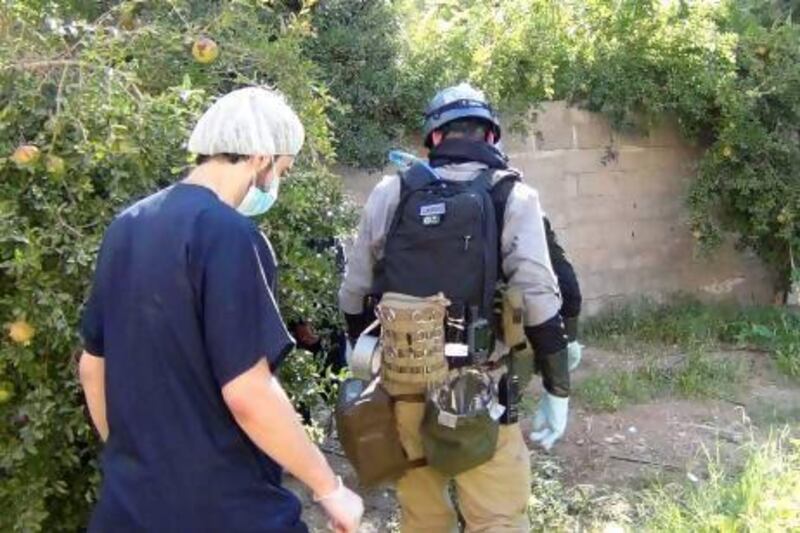Gaziantep, Turkey // UN weapons inspectors were shot at by snipers yesterday before taking blood and tissue samples from corpses at the scene of a chemical attack in Damascus.
The United Nations said the team of investigators visited two hospitals and interviewed witnesses, survivors and doctors, as part of an investigation into the use of poison gases that killed hundreds of people.
With growing indications that the US is considering a military strike on regime targets in response to the attacks, the US secretary of state John Kerry said last night that there must be accountability for the use of "the world's most heinous weapons".
"Our sense of basic humanity is offended, not only by this cowardly crime but also by the cynical attempt to cover it up," Mr Kerry said.
"He said it was clear to the US that chemical weapons had been used."
Earlier yesterday, Syrian president Bashar Al Assad gave a defiant interview to a Russian newspaper, denying his forces were responsible and warning America to stay away.
"Failure awaits the United States as in all previous wars it has unleashed, starting with Vietnam and up to the present day," he told the newspaper Izvestia.
"Accusations of this kind are entirely political," he said.
Gunfire hit the first vehicle in the six-car UN convoy as it sought to enter the district of Moadamiya, to the south-west of the capital, forcing the group to turn back.
None of the inspectors were hurt and they returned after a three-hour delay, successfully making their way into the besieged neighbourhood using alternative roads.
Martin Nesirky, spokesman for UN secretary general Ban Ki-moon, said a UN jeep was rendered unusable after being "deliberately shot at multiple times" in the no man's land separating rebel-held territory and areas under regime control.
The Syrian government blamed "terrorist gangs" for the shootings, just as it blames them for the use of poison gas. Opposition activists said they believed pro-regime gunmen were responsible.
Activists in Moadamiya said the inspectors went to the Rawda mosque and a field hospital, where they met doctors and victims of what appears to have been a poison gas attack in the early hours of Wednesday morning.
"They were in a hurry because of the delay and they wanted to leave before it got dark," said an activist who spoke with the inspectors in Moadamiya.
The area was hit with an artillery bombardment after they left.
"We prepared 30 samples for them from the dead bodies - blood, skin and hair. They also took their own samples from the bodies and of soil, they were more interested in collecting their own samples," he said.
The activist said the UN team was "professional" and did not make any comments on either the shooting that delayed their entry or on the alleged gas attack.
Under their mandate, the UN experts are only supposed to determine if chemical weapons were used in Wednesday attacks. They are not supposed to assign blame, although the details of what chemicals - if any - were used and how they were fired into Moadamiya and the eastern Ghouta, would give clues as to who was responsible.
A consensus, uniting pro- and anti-Assad factions, has emerged that some form of chemical weapon was used in two rebel held areas on the outskirts of Damascus.
Medecins Sans Frontieres, charity working inside Syria, said it had tracked 3,600 patients displaying "neurotoxic symptoms", of whom 355 had died.
But there is no agreement on who released the poison gases.
"It's a classic case of the fog of war ... there are too many people running around with too many agendas to get a clear picture, the whole place is an appalling minefield," said a military security advisor who works with international NGO in tracking the conflict.
"We know Assad has chemical weapons and he would surely use them if pushed, but there are extremists, Al Qaeda, in the rebel side who we know have been trying to get their hands on chemical weapons for some time and they would probably also use them if they could.
"We may never really know the truth," he said.
The US defence secretary, Chuck Hagel, said any response by Washington to the use of chemical weapons would be coordinated with allies, including Britain and France which have been supportive of military action against Mr Al Assad's forces.
The British prime minister, David Cameron, cut short a holiday to chair a top level security meeting on the issue.
Mr Cameron yesterday discussed the situation with the Russian president, Vladimir Putin.
Russia and China, which have given crucial diplomatic support to the Syrian regime, hold UN Security Council vetoes which mean any military action is likely to take without UN permission.
The Russian foreign minister, Sergei Lavrov, said yesterday that the US and its allies are on a "very dangerous slippery slope" to military intervention in Syria that will have "extremely dangerous" consequences for the region.
Turkey, which neighbours Syria and which has backed the anti-Assad rebellion, indicated it will support US military strikes outside of a UN mandate.
Iran, a backer of Assad, said action by the US would cross a "red line" and would result in "severe consequences".
twitter: For breaking news from the Gulf, the Middle East and around the globe follow The National World. Follow us





